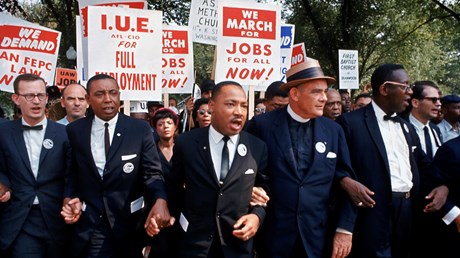The legacy of Martin Luther King Jr. reminds us to push past tweetable quotes and big talk to true Christlike love.

For a black boy growing up in Alabama trying to make sense of himself in a hostile world, Martin Luther King Jr. was my hero. Alongside a startingly pale Jesus, a picture of Martin hung beside photographs of my family. I knew Martin by sight. I could recognize the tenor of his voice.
The mental architecture of my young black imagination was formed by grainy videos of mass church meetings and marches and by the hymns and spirituals that threatened to shake the United States to its foundations. I knew about Selma, Birmingham, and Montgomery before I could find them on a map of my state. I do not remember not remembering Martin.
By contrast, the King that I see online on Martin Luther King Jr. Day is a stranger to me. This beloved figure is in part the construction of a society that never fully loved him or the cause he represented. King died an unpopular man. In 1968, the year of his death, 75 percent of Americans disapproved of his views and activities. That was up from 50 percent in 1963.
Today, his approval rating nears 90 percent. Some might suggest that with hindsight, Americans have come to appreciate King in a way that was impossible during the racist era in which he lived. But things are not that simple. If social media is any indication, a large portion of America still hasn’t wrestled with the King of 1968. A USA Today study of the most tweeted MLK lines are startling in their vagueness:
“The time is always right to do what is right.”
“Darkness cannot drive out darkness; only light can do that. Hate cannot drive out hate; only love can do that.”
“Injustice anywhere is a threat to justice everywhere.”
These were not the quotes that stuck to my ribs as a kid. I remember King talking ...
from Christianity Today Magazine
via


.gif)

.gif)
.gif)
